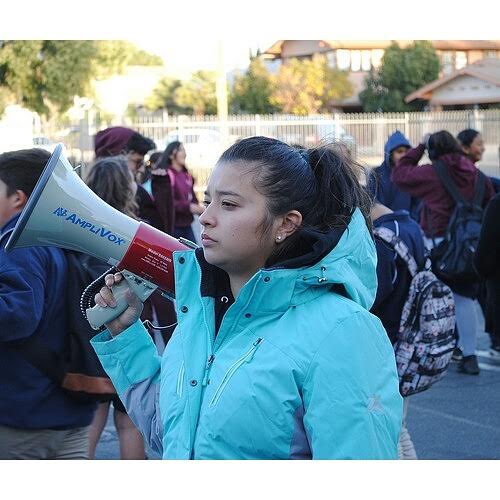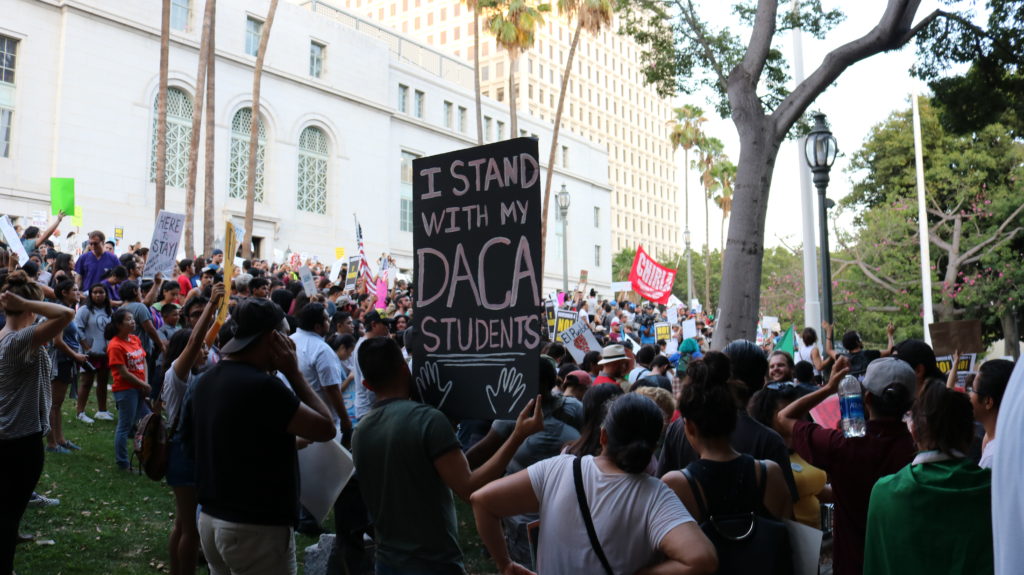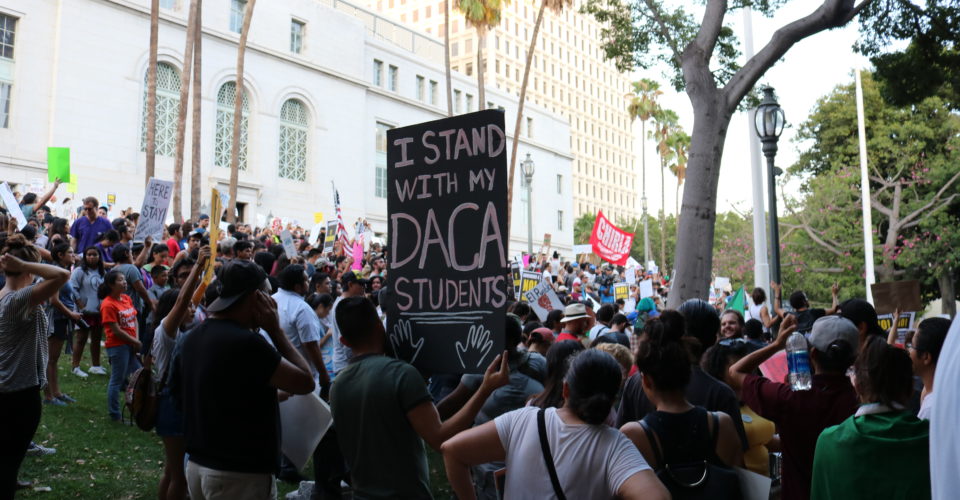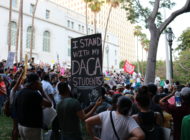Central American Resource Center (CARECEN) legal director Daniel Sharp said that the idea that DACA recipients may be removed from the country quickly isn’t true. “And that is the vast majority – over 95% – of DACA holders are not subject to an order of removal,” Said Sharp.
BY EDUARDO GARCÍA
EL NUEVO SOL
Even if the U.S. Supreme Court decides that the Trump administration can end Deferred Action for Childhood Arrivals (DACA), DACA recipients have the right to contest removal in immigration court.
Central American Resource Center (CARECEN) legal director Daniel Sharp said Dec. 11 at the Kenneth Hahn Hall of Administration that the idea that DACA recipients may be removed from the country quickly isn’t true. They can exercise their due process rights and their right to a hearing in an immigration court.
“And that is the vast majority – over 95% – of DACA holders are not subject to an order of removal,” Sharp said. “There’s this small percentage who had an issue when they potentially first came into the country or because their parents submitted an application who have orders of deportation, but that is a small minority.”
About 200,000 of DACA recipients live in California and paid $2.1 billion in federal taxes and $1 billion in state and local taxes. 96% of all recipients in the country are enrolled in school or are employed, according to a national survey of DACA holders.
Sharp said even with the administration’s attempts to speed up the deportation process, the average timeframe, without taking into account for appeals, is over three years for a decision from an immigration judge.
“That is if the administration does the unthinkable,” Sharp said. “And after prevailing in this case not only pulls the status but also attempts to put over 800,000 Dreamers in removal proceedings in a court system that is already clogged in backlog in courts around the country.”

Officials said they urge DACA recipients to renew their status soon, as the $425 fee may increase to $765 after the administration reviews public comments until Dec. 30.
President and general counsel of the Mexican American Legal Defense and Educational Fund Thomas Saenz said even if the Supreme Court sides with the Trump administration to remove the initiative, DACA recipients will not immediately lose work authorization. The administration will allow work authorization until it expires without renewal.
While the Supreme Court is expected to decide on the case by June 2020, Saenz said that the media commentators’ and pundits’ prediction from the Nov. 12 oral arguments that the high court will allow the Trump administration to end DACA is “irresponsible.” An example he gave was when the high court was predicted to allow the citizenship question to remain on the 2020 census, but ruled otherwise months later.
“We should all be assured that we do not know the outcome of these cases at this point,” Saenz said. “The kinds of cases where we see changes in what is expected at an oral argument and the ultimate outcome are often cases that involve the institutional integrity of the Supreme Court.”
California has a filing fee assistance available for DACA recipients while funds last. If those funds are exhausted, the state has additional funding for beneficiaries whose household income is under 250% of the poverty line. DACA holders can access assistance through CARECEN, Coalition for Humane Immigrant Rights (CHIRLA) and among others.
Legal advocate for DACA and Asian Americans Advancing Justice (AAJC) Tiffany Panlilio said AAJC has services in Korean, Chinese, Thai and Tagalog and has free legal services for beneficiaries who qualify for the filing fee assistance. The organization has been helping DACA recipients get the funds they need to renew their status and offers free general immigration screening.
Sharp said when his team screened a large number of Dreamers in 2012, they found that about 20 to 25% “were eligible or potentially eligible for another form of more permanent immigration relief – permanent legal status.”
Sharp added that since then, many Dreamers have taken advantage of eligibility with legal advice or representation. However, many others have not.
“It is really important that folks who’ve simply been renewing their DACA status with or without the help of someone else seek legal advice from an attorney or a federally accredited representative at a certified nonprofit organization that can give them the advice and potentially representation that they need,” Sharp said.
Sharp said there are hundreds of offices of unauthorized, unlicensed providers of legal services that harm people. He said CARECEN helps direct people to organizations and law offices that help them receive counsel and representation.
Criminal defense attorney Lara Yeretsian said DACA recipients have a lot to lose in the criminal defense world and can face harsher or life-changing consequences, such as an automatic bar from eligibility or removal from the country. She said these can happen even if they’re arrested or convicted of driving under the influence.
Yeretsian said anyone can be barred from DACA status if they meet any of the three criteria: felony convictions, significant misdemeanors or three non-significant misdemeanors.
Yeretsian said felony convictions or significant misdemeanors can include “domestic violence, any sexual abuse or exploitation type crimes, unlawful possession or use of a firearm, drug sales including distribution or trafficking, burglary, and driving under the influence of alcohol or drugs.”
Yeretsian said non-significant misdemeanors can be any misdemeanor, such as shoplifting a $5 item. While a number of courts wouldn’t give real consequences to citizens, the courts could argue that the DACA holder committed shoplifting burglary.
Yeretsian said there are exceptions that can allow DACA recipients to not get into deep trouble, such as driving without a license or with a suspended license. Another includes expungement if they can get their misdemeanors or felony erased, which removes the automatic bar to DACA renewal.
“The courts have a discretion to, despite all the possible exceptions, to look at the entire picture and say, ‘You know what, there’s a public safety issue here. We don’t want this person here anymore,’” Yeretsian said.
Yeretsian said DACA recipients should stay as far away from the criminal justice system as possible. She said sometimes, especially in California, defense attorneys or prosecutors are understanding and take immigration consequences into consideration, but “there’s no guarantee that they will, and you cannot take that risk.”
“If you’re arrested for some reason and you’re a DACA recipient, please go to the right people, Yeretsian said. “Don’t just go to anybody. Make sure you’re going to an attorney who specializes in the field, understands DACA and understands immigration consequences and does right by you and doesn’t take any deal because you, again, you’ve got a lot to lose.”
Executive director of the Department of Consumer and Business Affairs (DCBA) Rigoberto Reyes said Los Angeles’ 36 county departments provide initiatives to support immigrant communities. He encourages immigrants and DACA recipients to know their rights.
“Someone knocks on their door, what are they supposed to say?” Reyes said. “How are they supposed to connect within the attorney who really knows what the options are, rather than going to an immigration consultant that’s going to lead them through a harmful path? Very important.”
Reyes said his team’s office is in the Office of Immigrant Affairs, where they have immigrants and their families learn about the county’s services and how to access those services.
Saenz said residents and DACA recipients are assured that “they have strong claims to relief from being removed from the United States” and gives them three pieces of advice.
First, he advises them to know their rights and know they have the right to contest removal before an immigration court if they are arrested or picked up by U.S. Immigration and Customs Enforcement (ICE).
“They have all been in the country long enough that no one can reasonably question their right to a court hearing and to a determination of their claims equitable and legal to remain in this country,” Saenz said.
Second, he advises them, beyond knowing their rights, to never waive or “give up your right to a court here to agree to voluntary departure” and to “never sign a waiver of your rights,” even if they find themselves in the custody of ICE.
Third, he advises them that when they assert and refuse to waive their rights, they are not alone.
“You have millions of people behind you ready to work with you to support you in asserting your right to a court hearing and ultimately to remain in this country,” Saenz said. “In the end, we know what we’ve always known, which is we need leadership in the United States Senate and in the White House to exercise their authority responsibly and to move forward a legislative solution to our DACA recipients, a solution that would provide them the right to continue to thrive and to contribute to our economy, to our society, and to our country by being provided legal status.”

Thousands of people gathered at Placita Olvera in support of DACA on Sept. 5. The march led supporters to Los Angeles City Hall where they waved their posters and yelled their chants.
Tags: CARECEN DACA Daniel Sharp Lara Yeretsian Legal advocate for DACA and Asian Americans Advancing Justice (AAJC) Mexican American Legal Defense and Educational Fund Thomas Saenz Tiffany Panlilio





















